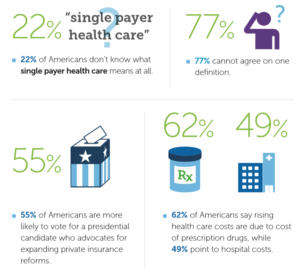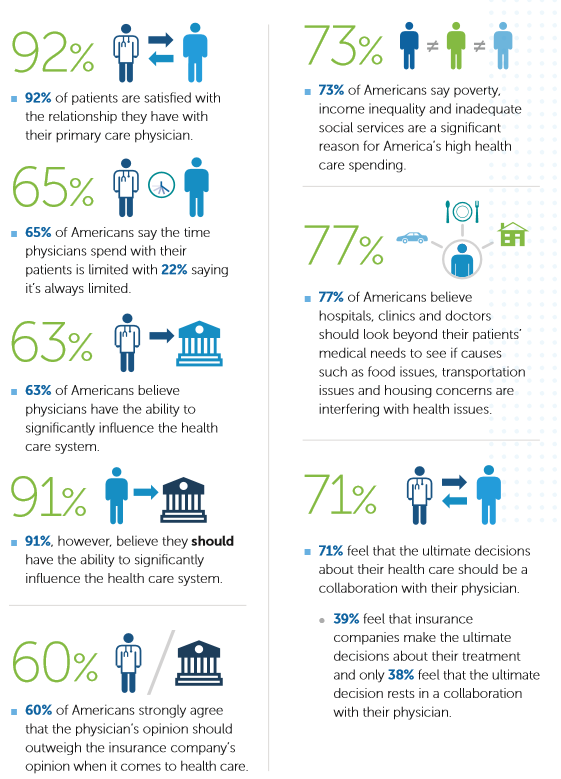Study of Americans’ Attitudes on Health Care Uncovers Deep Concern About Costs, Policies
Health care costs weigh heavily on Americans’ minds, with 73% concerned about their ability to pay for an unexpected medical treatment, according to the 2019 biennial Survey of America’s Patients by the Physicians Foundation , a nonprofit seeking to advance the work of practicing physicians and help them facilitate the delivery of high-quality health care to patients.
In addition, the survey found that Americans are unclear about policy proposals for a single-payer system, with an overwhelming number (77%) confused about what a single-payer system means. Patients support the physician’s role in leading health care, with 94% of agreeing that the physician should be allowed to overrule the health insurance company and 91% believing they should have the ability to significantly influence the health care system..
“The Physicians Foundation’s survey is meant to be a comprehensive look at patients’ views on multiple aspects of our health care system; however, it’s clear that costs, policy issues and the opioid epidemic are areas of concern,” noted Gary Price, MD, president of The Physicians Foundation. “The survey also shows that patients want their physicians to assume greater leadership roles in advocating for solutions to these pressing issues.”
Costs
The survey found that the rise in what patients pay for medical care is causing significant financial concern with nearly half (42%) of Americans only being able to afford $500 or less in unexpected medical expenses before facing financial issues.
 To make matters worse, 84% of patients are concerned that health care costs will affect them in the future. When thinking of their care, most patients associate cost (86%) and waiting on insurance prior authorizations (72%) as negatively impacting their care. As far as what contributes to the rising cost of care, Americans are blaming the cost of prescription drugs (62%) and hospital costs (49%).
To make matters worse, 84% of patients are concerned that health care costs will affect them in the future. When thinking of their care, most patients associate cost (86%) and waiting on insurance prior authorizations (72%) as negatively impacting their care. As far as what contributes to the rising cost of care, Americans are blaming the cost of prescription drugs (62%) and hospital costs (49%).
Politics
With the presidential campaign underway, the current political discussion about health care is confusing to patients. In fact, nearly one in four Americans (22%) are not sure exactly what “single payer health care” means, while 77% cannot agree on one definition. With confusion swirling around the term, the majority (55%) of Americans are more likely to vote for a candidate who advocates for expanding private insurance reforms.
Physician Leadership
Nearly all (91%) Americans believe physicians should have the ability to significantly influence the health care system; while 71% feel that the ultimate decisions about their health care should be made in collaboration with their physician. Further, 94% of Americans agree that the physician should be allowed to overrule the health insurance company and 93% believe the physician’s opinion should outweigh the insurance company’s opinion when it comes to health care.
“Patients want us as their advocates and believe physicians should have a great deal of influence on our health care system because we have patients’ best interests at heart,” said Dr. Price. “We cannot sit idly by as our patients are negatively impacted by ill-informed policy reform. The physician-patient relationship should be at the forefront of our health care system with the goal of driving down costs while improving the delivery of high-quality care for all people.”
Additional findings from the 2019 Survey of America’s Patients include:
- 92% of patients are satisfied with the relationship they have with their primary care physician.
- 65% of Americans say the time physicians spend with patients is limited, with 22% saying it’s always limited.
- 63% of Americans believe physicians have the ability to significantly influence the health care system.
- 73% of Americans say poverty, income inequality and inadequate social services are a significant reason for America’s high health care spending.
- 77% of Americans believe hospitals, clinics and doctors should look beyond their patients’ medical needs to see if causes such as food issues, transportation issues and housing concerns are interfering with health issues.
Opioids
When it comes to the opioid epidemic, the survey shows that this continues to be a serious public health emergency impacting millions of Americans. Shockingly, 35% of Americans know someone who has abused or is addicted to opioids and 21% know someone who has died because of opioid use. Patients blame pharmaceutical companies (53%) and physicians (39%) for their role in causing the epidemic even though data from the Physicians Foundation’s 2018 Survey of America’s Physicians
found that 69% of physicians are prescribing fewer pain medications.
With the opioid epidemic top of mind, 60% of Americans believe rehabilitative services are essential health care, while 45% believe care for substance abuse is essential. A majority (69%) believe that care for mental health disorders is essential.
“It is clear, now more than ever, patients need our support. They need direct and open communication about the very real issues facing them today,” said Dr. Price. “From costs, to the impending presidential election and the opioid epidemic, it’s time our health care system takes into account the patient voice if we hope to move the needle on health care reform. More than ever, physicians need to show critical leadership on these issues.”
For a complete breakdown of the survey and its results, click here.
###





